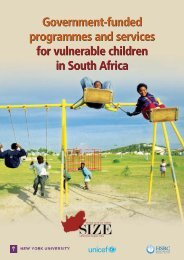Download the complete report - Unicef
Download the complete report - Unicef
Download the complete report - Unicef
You also want an ePaper? Increase the reach of your titles
YUMPU automatically turns print PDFs into web optimized ePapers that Google loves.
framework, it became a part of <strong>the</strong> system and was integrated thus, and <strong>the</strong>reafter<br />
factored into <strong>the</strong>ir work plan and budget. This was done in a phased manner, taking<br />
3-3.5 years to move across <strong>the</strong> state.<br />
Peer assessments and school visits: State field teams undertook peer assessment for<br />
each o<strong>the</strong>r. This worked well allowing <strong>the</strong>m to share and learn from one ano<strong>the</strong>r. School<br />
visits happened for three months and monthly meetings were done at <strong>the</strong> cluster level<br />
where teachers shared/analysed findings of <strong>the</strong> process and went back to baseline to<br />
see what <strong>the</strong>y achieved. Decision making happened at monthly meetings. They did not<br />
go back to Director or state MoIS. Everything happened at block and cluster level.<br />
Ownership and enthusiasm: Teachers and cluster resource coordinators felt involved<br />
since <strong>the</strong>y were part of something <strong>the</strong>y were creating. This was embedded in <strong>the</strong><br />
national and state planning frameworks with proper allocation of budgets and issuance<br />
of directives/government orders.<br />
Outputs: A range of standards and tools were developed and tested. These included<br />
Standards for Teacher Performance/Trainer Performance/HMs, CRCs, BRCs, DIETs<br />
and SCERTs. Also state-specific versions of standards, tools (for assessing current<br />
performance against standards), Peer State Reviews, Desk Reviews of Teacher<br />
Training and inputs towards improved planning for quality improvement would need to<br />
be developed.<br />
Including in annual SSA work plan: The programme was implemented in <strong>the</strong> planning<br />
process of <strong>the</strong> annual SSA work plan. Performance standards were reviewed, baseline<br />
was done, enabling conditions provided and <strong>the</strong>n rolled out in schools. Preparations<br />
were done in regular schools at block and cluster levels. Resource groups were created<br />
at state, block and district level and implementation of <strong>the</strong> process was done through<br />
in-service teacher training that provided 20 days budget for training in a year.<br />
Teachers’ standards divided into various levels of difficulties: These included<br />
cognitive dimension to understand background of children and <strong>the</strong>ir academics levels;<br />
social dimension to create warm and attractive emotional environment; physical<br />
dimension to encourage children to maintain <strong>the</strong> school and keep <strong>the</strong>ir class tidy;<br />
organisational dimension to ensure teacher arrives on time and stays till closing time.<br />
Establishing partnerships: State Core Teams (SSA + SCERT); State Field Teams to<br />
undertake Peer Assessment; National Core Team (involving NCERT & MHRD); MHRD<br />
supervision and TSG support; National Coordinator and UNICEF support at different levels.<br />
Next Steps<br />
The initiative would need to be fur<strong>the</strong>r embedded into <strong>the</strong> education system at <strong>the</strong><br />
state level. It would need involvement of Teacher Associations; refining of standards to<br />
make it more contextual; capacity building of teachers, head teachers, CRCs & BRCs<br />
linked to Adepts; strong Code of Conduct for teachers and administrators to create<br />
greater ownership and definitive statements like, “I will not let any child be abused in<br />
my school”. Some of <strong>the</strong> inherent systemic limitations would need to be overcome, like<br />
<strong>the</strong>re being too much focus on documentation; short-term duration of teachers; and<br />
lack of consistent leadership.<br />
40<br />
Consultation on Supportive Supervision to Streng<strong>the</strong>n<br />
Capacity of Frontline Workers and Service Providers

















